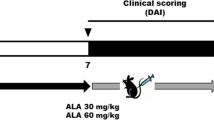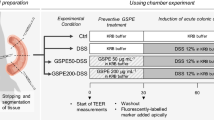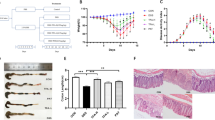Abstract
Background
Grape seed extract (GSE) constitutes a rich source of procyanidins. GSE has been demonstrated to exert encouraging anti-inflammatory and anti-ulcer properties in experimental settings, although its effects on inflammation of the colon remain undefined.
Aim
To determine the effects of GSE in a rat model of dextran sulphate sodium (DSS) for ulcerative colitis.
Methods
Male Sprague–Dawley rats were gavaged daily (days 0–10) with GSE (400 mg/kg). Ulcerative colitis was induced by substituting DSS (2 % w/v) for drinking water from days 5–10. A sucrose breath test was performed on day 11 to determine small bowel function and intestinal tissues were collected for histological analyses. Statistical analysis was by one-way or repeated-measures ANOVA and p < 0.05 was considered significant.
Results
Compared to DSS-treated controls, GSE significantly decreased ileal villus height (14 %; p < 0.01) and mucosal thickness (13 %; p < 0.01) towards the values of normal controls. GSE reduced qualitative histological severity score (p < 0.05) in the proximal colon, although no significant effect was evident in the distal colon. However, GSE failed to prevent DSS-induced damage to the crypts of both colonic regions. Administration of GSE did not negatively impact metabolic parameters, nor did it induce any deleterious gastrointestinal side effects in healthy animals.
Conclusions
GSE decreased the severity of selected markers of DSS-induced colitis in the distal ileum and proximal colon, suggesting the potential as an adjuvant therapy for the treatment of ulcerative colitis. Future studies of GSE should investigate alternative delivery methods and treatment regimens, further seeking to identify the individual bioactive factors.






Similar content being viewed by others
References
Geier MS, Butler RN, Giffard PM, Howarth GS. Prebiotic and synbiotic fructooligosaccharide administration fails to reduce the severity of experimental colitis in rats. Dis Colon Rectum. 2007;50:1061–1069.
Danese S, Angelucci E, Malesci A, Caprilli R. Biological agents for ulcerative colitis: hypes and hopes. Med Res Rev. 2008;28:201–218.
Carter MJ, Lobo AJ, Travis SP. Guidelines for the management of inflammatory bowel disease in adults. Gut. 2004;53:V1–V16.
Hendrickson BA, Gokhale R, Cho JH. Clinical aspects and pathophysiology of inflammatory bowel disease. Clin Microbiol Rev. 2002;15:79–94.
Podolsky DK. Inflammatory bowel disease (1). N Engl J Med. 1991;325:928–937.
Langan RC, Gotsch PB, Krafczyk MA, Skillinge DD. Ulcerative colitis: diagnosis and treatment. Am Fam Physician. 2007;76:1323–1330.
Targan SR, Karp LC. Defects in mucosal immunity leading to ulcerative colitis. Immunol Rev. 2005;206:296–305.
Boismenu R, Chen Y. Insights from mouse models of colitis. J Leukoc Biol. 2000;67:267–278.
Podolsky DK. Inflammatory bowel disease (2). N Engl J Med. 1991;325:1008–1016.
Murthy S, Flanigan A, Clearfield H. Colorectal cancer in inflammatory bowel disease: molecular and clinical features. Gastroenterol Clin North Am. 2002;31:551–564.
Tenikoff D, Murphy KJ, Le M, Howe PR, Howarth GS. Lyprinol (stabilised lipid extract of New Zealand green-lipped mussel): a potential preventative treatment modality for inflammatory bowel disease. J Gastroenterol. 2005;40:361–365.
Geier MS, Butler RN, Giffard PM, Howarth GS. Lactobacillus fermentum br11, a potential new probiotic, alleviates symptoms of colitis induced by dextran sulfate sodium (dss) in rats. Int J Food Microbiol. 2007;114:267–274.
Yazbeck R, Howarth GS, Geier MS, Demuth HU, Abbott CA. Inhibiting dipeptidyl peptidase activity partially ameliorates colitis in mice. Front Biosci. 2008;13:6850–6858.
Wright TH, Yazbeck R, Lymn KA, et al. The herbal extract, iberogast, improves jejunal integrity in rats with 5-fluorouracil (5-FU)-induced mucositis. Cancer Biol Ther. 2009;8:923–929.
Cheah KY, Howarth GS, Yazbeck R, et al. Grape seed extract protects IEC-6 cells from chemotherapy-induced cytotoxicity and improves parameters of small intestinal mucositis in rats with experimentally induced mucositis. Cancer Biol Ther. 2009;8:382–390.
Havsteen B. Flavonoids, a class of natural products of high pharmacological potency. Biochem Pharmacol. 1983;32:1141–1148.
Fine AM. Oligomeric proanthocyanidin complexes: history, structure, and phytopharmaceutical applications. Altern Med Rev. 2000;5:144–151.
Nijveldt RJ, van Nood E, van Hoorn DE, Boelens PG, van Norren K, van Leeuwen PA. Flavonoids: a review of probable mechanisms of action and potential applications. Am J Clin Nutr. 2001;74:418–425.
Tran CD, Ball JM, Sundar S, Coyle P, Howarth GS. The role of zinc and metallothionein in the dextran sulfate sodium-induced colitis mouse model. Dig Dis Sci. 2007;52:2113–2121.
Okayasu I, Hatakeyama S, Yamada M, Ohkusa T, Inagaki Y, Nakaya R. A novel method in the induction of reliable experimental acute and chronic ulcerative colitis in mice. Gastroenterology. 1990;98:694–702.
Geier MS, Tenikoff D, Yazbeck R, McCaughan GW, Abbott CA, Howarth GS. Development and resolution of experimental colitis in mice with targeted deletion of dipeptidyl peptidase iv. J Cell Physiol. 2005;204:687–692.
Tomas FM, Knowles SE, Owens PC, et al. Increased weight gain, nitrogen retention and muscle protein synthesis following treatment of diabetic rats with insulin-like growth factor (IGF)-I and des(1–3)IGF-I. Biochem J. 1991;276:547–554.
Howarth GS, Xian CJ, Read LC. Insulin-like growth factor-I partially attenuates colonic damage in rats with experimental colitis induced by oral dextran sulphate sodium. Scand J Gastroenterol. 1998;33:180–190.
Tooley KL, Saxon BR, Webster J, et al. A novel non-invasive biomarker for assessment of small intestinal mucositis in children with cancer undergoing chemotherapy. Cancer Biol Ther. 2006;5:1275–1281.
Sehirli O, Ozel Y, Dulundu E, Topaloglu U, Ercan F, Sener G. Grape seed extract treatment reduces hepatic ischemia-reperfusion injury in rats. Phytother Res. 2008;22:43–48.
Sato M, Bagchi D, Tosaki A, Das DK. Grape seed proanthocyanidin reduces cardiomyocyte apoptosis by inhibiting ischemia/reperfusion-induced activation of jnk-1 and c-jun. Free Radic Biol Med. 2001;31:729–737.
Saito M, Hosoyama H, Ariga T, Kataoka S, Yamaji N. Antiulcer activity of grape seed extract and procyanidins. J Agric Food Chem. 1998;46:1460–1464.
Ohtsuka Y, Sanderson IR. Dextran sulfate sodium-induced inflammation is enhanced by intestinal epithelial cell chemokine expression in mice. Pediatr Res. 2003;53:143–147.
Tanaka M, Kazuma K. Ulcerative colitis: factors affecting difficulties of life and psychological well being of patients in remission. J Clin Nurs. 2005;14:65–73.
Geier MS, Smith CL, Butler RN, Howarth GS. Small-intestinal manifestations of dextran sulfate sodium consumption in rats and assessment of the effects of lactobacillus fermentum BR11. Dig Dis Sci. 2009;54:1222–1228.
Haxhija EQ, Yang H, Spencer AU, Sun X, Teitelbaum DH. Intestinal epithelial cell proliferation is dependent on the site of massive small bowel resection. Pediatr Surg Int. 2007;23:379–390.
Fukushima K, Haneda S, Funayama Y, et al. An approach to analyze mechanisms of intestinal adaptation following total proctocolectomy. J Gastrointest Surg. 2006;10:662–671.
Houde V, Grenier D, Chandad F. Protective effects of grape seed procyanidins against oxidative stress induced by lipopolysaccharides of periodontopathogens. J Periodontol. 2006;77:1371–1379.
Acknowledgments
The authors would like to acknowledge Ruth Lindsay, Roger Yazbeck, Mark Geier, Lynn Scarman, and Jo Cool for their assistance with the animal experiments, data collection, and data analysis. Professor Gordon Howarth is supported by the Sally Birch Cancer Council Australia Research Fellowship in Cancer Control.
Conflict of interest
None.
Author information
Authors and Affiliations
Corresponding author
Rights and permissions
About this article
Cite this article
Cheah, K.Y., Bastian, S.E.P., Acott, T.M.V. et al. Grape Seed Extract Reduces the Severity of Selected Disease Markers in the Proximal Colon of Dextran Sulphate Sodium-Induced Colitis in Rats. Dig Dis Sci 58, 970–977 (2013). https://doi.org/10.1007/s10620-012-2464-1
Received:
Accepted:
Published:
Issue Date:
DOI: https://doi.org/10.1007/s10620-012-2464-1




